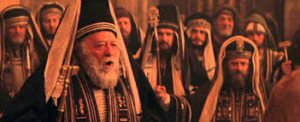The Laws of the Great Sanhedrin Regarding Trials

(1) there was to be no arrest that was affected by a bribe,
(2) there were to be no steps of criminal proceedings after sunset,
(3) members of Sanhedrin were not allowed to participate in the arrest,
(4) there were to be no trials before the morning sacrifice,
(5) there were to be no secret trials, only public ones,
(6) Sanhedrin trials could only be conducted in the hall of judgment at the Temple,
(7) the defense would speak first, and then the accusation would be made,
(8) all could argue in favor of acquittal, but all could not argue for a conviction,
(9) there were to be two or three witnesses and their testimony had to agree in every detail for conviction,
(10) there was to be no allowance for the accused to testify against himself,
(11) the High Priest was forbidden to tear his clothes,
(12) charges could not originate with the judges, they could only investigate charges,
(13) the accusation of blasphemy was only valid if he pronounced the name of God himself,
(14) a person could not be condemned on the basis of his own words,
(15) the verdict could not be announced at night, only in the daytime,
(16) in cases of capital punishment, the trial and the guilty verdict could not occur at the same time but had to be separated by at least twenty-four hours,
(17) voting for the death penalty had to be done by individual count beginning with the youngest so that the elders would not influence the young,
(18) a unanimous decision for guilt showed innocence since it was impossible for 71 men to agree without plotting,
(19) the sentence could only be pronounced three days after the guilty verdict,
(20) judges were to be kind and humane,
(21) a person condemned to death was not to be scourged or beaten beforehand (Tractate Sanhedrin). Thus, in spite of His oppression and affliction, Jesus did not fight it; rather, He gave Himself willingly to it.1515



Leave A Comment